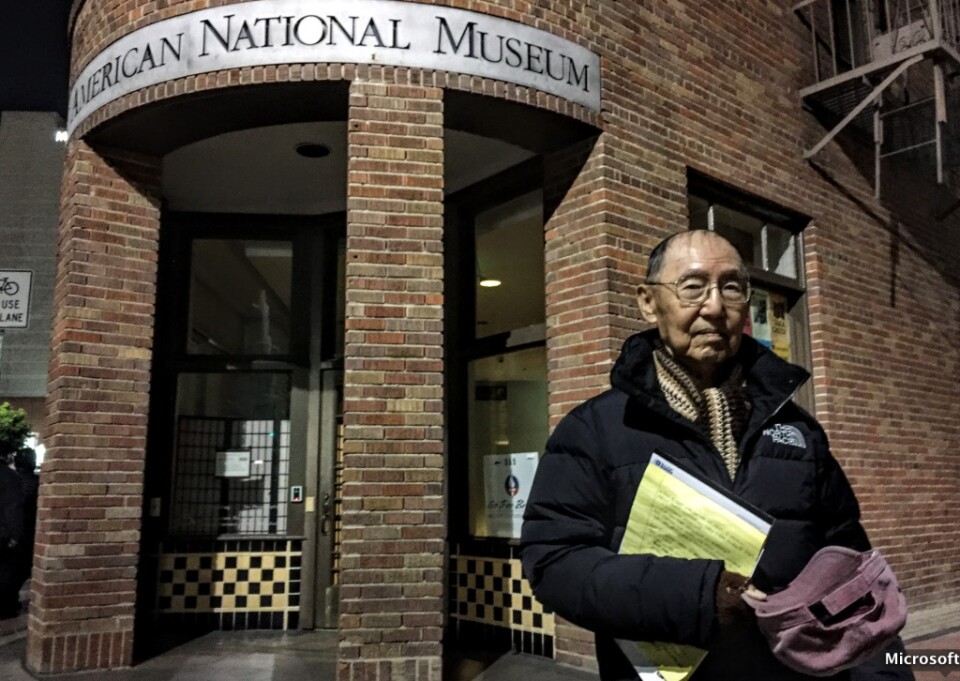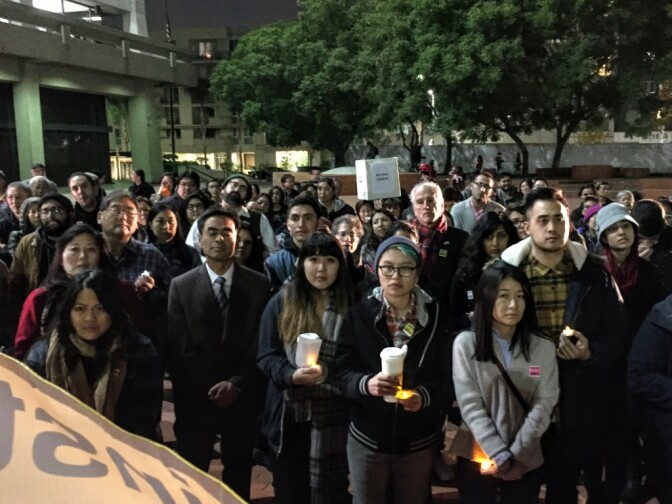This story is free to read because readers choose to support LAist. If you find value in independent local reporting, make a donation to power our newsroom today.
This archival content was originally written for and published on KPCC.org. Keep in mind that links and images may no longer work — and references may be outdated.
Japanese-Americans stand with Muslims in wake of attacks
When 80-year-old Jim Matsuoka hears about the recent wave of hate crimes against Muslim-Americans, it feels deeply personal.
He and his family were among the 120,000 people incarcerated by the U.S. government during World War II because they were of Japanese descent, and suspected of disloyalty even though most, like Matsuoka, were citizens.
Seventy-five years later, Matsuoka is worried that Muslim-Americans are facing the same type of xenophobia and discrimination. "A lot of people think we’ve changed a lot but as far as I’m concerned there was racism then, and there’s racism now," Matsuoka said.

On Wednesday night, Matsuoka drove from his West Covina home to show solidarity with Muslim-Americans and other immigrants at a vigil in Little Tokyo that was followed by a march. About 200 people took part in the event, timed to the 75th anniversary of the attack on Pearl Harbor, after which the U.S. started building internment camps.
"Looking toward the future as Japanese-Americans, I hope we can pledge that this will not happen again no matter who that group of people is," said Sean Miura, who co-emceed the vigil in the plaza of the Japanese American Cultural and Community Center.
Speakers expressed anxiety and the need for vigilance after an uptick in anti-Muslim incidents following the election of Donald Trump, ranging from arson to assaults, as well as talk of a national registry for Muslims among Trump supporters.
Duaa Alwan, a board member of the Islamic Shura Council of Southern California who spoke at the vigil, said it was "empowering" to see the level of support Muslim-Americans had from the larger community, especially from former internees.
"I'm honored to be standing next to people who actually sacrificed a lot," Alwan said.

Matsuoka said he was 7 when his family was sent to the Manzanar camp in the Central Valley. He remembers running around and noticing barbed wire and guards: "You could say my playground was a prison camp."
He said life was not much better after internment. His father had lost 20 years of savings when the family was forced to relocate.
"My father couldn’t get a job and we wound up in a trailer camp in Long Beach," Matsuoka said. "We were poor in camp, and we were even poorer outside."
And, he said, Japanese-Americans were still eyed with suspicion. For many years, when the anniversary of Pearl Harbor rolled around, he felt like they were being blamed for it.
"I keep saying it wasn’t me on the plane," Matsuoka said with a wry laugh. "I was too young to fly."

Matsuoka said he didn't realize the degree to which his civil rights had been violated until he was an adult. He became an activist and during the 70's and 80's set to work seeking redress for former internees.
"To stick 120,000 people into (an internment) camp based on their race, how vicious can that be?" Matsuoka said. "There's no way to make nice-y about it."
A bittersweet victory came in 1988, when President Reagan authorized $20,000 in compensation to each internment survivor.
One of the groups that led the fight for reparations, Nikkei for Civil Rights & Redress — Matsuoka sits on the board— helped to put on Wednesday night's event, along with the Nikkei Progressives and the Vigilant Love Coalition.
The march ended at 1st and Central, by the Japanese American National Museum. Matsuoka said his father used to attend services at a Buddhist temple on that corner.
Matsuoka noted it's also where the family waited with others to board a bus to Manzanar. Matsuoka said he can’t let something like that ever happen again.












